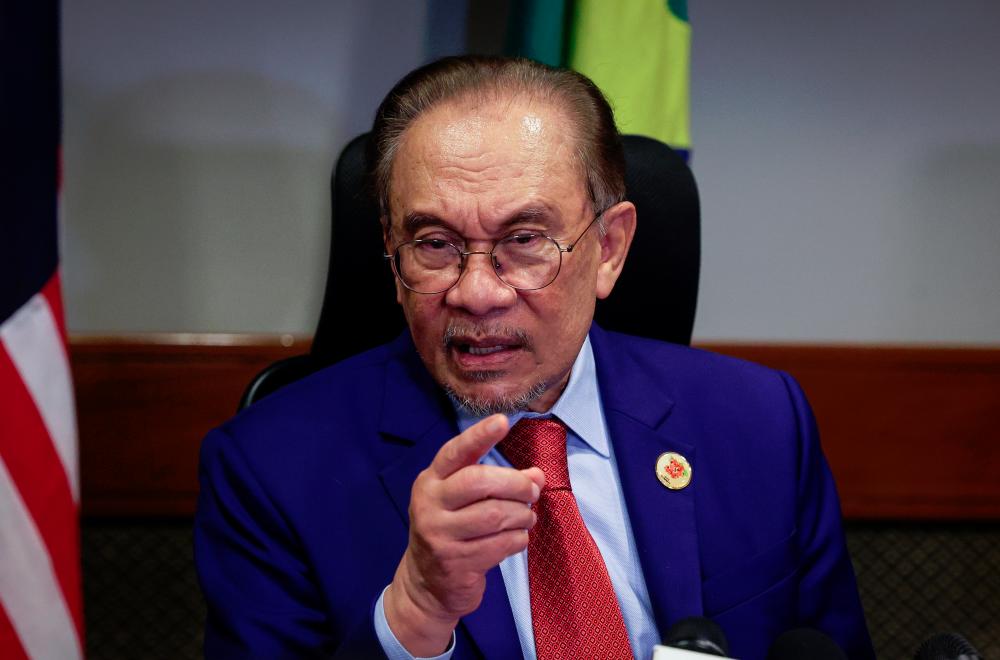RIO DE JANEIRO: Prime Minister Datuk Seri Anwar Ibrahim’s inaugural official visit to Brazil has paved the way for new economic opportunities for Malaysia, especially in the semiconductor industry.
Putrajaya and Brasilia have pledged to collaborate in developing a robust semiconductor ecosystem in the Latin American nation, marking a new chapter in bilateral ties.
Brazil is eager to collaborate with Malaysia due to Malaysia’s reputation as a renowned global semiconductor hub and its comprehensive ecosystem, as well as its position as the world’s sixth-largest semiconductor exporter.
“Although we are from distant lands, the potential is huge. Brazil is one of the pillars of the Latin American economy, and it offers huge opportunities (for Malaysian companies) while undergoing an economic reconstruction,” Anwar said during a roundtable meeting with representatives of the semiconductor industry and business leaders here.
The Prime Minister was in Rio de Janeiro from Nov 16-19 on an official visit at the invitation of Brazilian President Luiz Inácio Lula da Silva and as a guest country at the inter-governmental forum Group of 20 (G20) Summit.
The vibrant coastal city is renowned for its iconic beaches like Copacabana and Ipanema.
Although Brazil’s semiconductor industry is relatively small compared to Malaysia, there seems to be ample synergy between the two countries.
Malaysia has a comprehensive semiconductor ecosystem, with a strong back-end and outsourced semiconductor assembly and test (OSAT) infrastructure, supported by advanced manufacturing capabilities and a skilled workforce, while Brazil has a competitive edge in integrated circuit (IC) design.
Currently, Malaysia is the sixth-largest semiconductor exporter globally, with exports exceeding US$85 billion (RM380 billion), while Brazil’s semiconductor export value stands at only US$1.2 billion (as of 2022), which means there is much potential for growth.
Hence, with Malaysia’s advanced manufacturing capabilities and Brazil’s growing tech ambitions, this partnership holds the promise of strengthening global supply chains and enhancing innovation.
Anwar, who is also Malaysia’s Finance Minister, said that the potential collaboration in the semiconductor industry was one of several topics discussed during his meeting with Lula on Sunday.
As the world’s semiconductor demand continues to surge, this collaboration comes at an opportune time, setting the stage for a future where both countries play pivotal roles in the industry and beyond.
In a joint statement, both leaders expressed their support for efforts to develop bilateral collaboration in the semiconductor sector through increasing dialogue between governments, private sector and research and development and innovation institutions of both countries.
The bilateral meeting culminated in the signing of two memoranda of understanding involving the semiconductor industries of Malaysia and Brazil.
As part of his participation in the G20, Anwar delivered national statements on “The Fight Against Hunger and Poverty” and “Reform of Global Governance Institutions.”
At the “Reform of Global Governance Institutions” session, the Prime Minister called for a reform and wider representation of the United Nations Security Council (UNSC) veto power held by the P5 or Permanent Five members.
He said the current setting is “grossly unfair,” and that the UNSC should be more inclusive, emphasising the need for representation from Latin America and Africa.
The five permanent members of the UNSC, also known as the Big Five, are China, France, Russia, the United Kingdom (UK) and the United States.
Anwar’s call aligns closely with the G20 Rio de Janeiro Leaders’ Declaration, which underscored the need for transformative reform of the UNSC.
The declaration highlighted the need for an enlarged UNSC that improves the representation of underrepresented and unrepresented regions and groups, such as Africa, Asia-Pacific, and Latin America and the Caribbean.
Malaysia also joined the Global Alliance Against Hunger and Poverty, an initiative led by Brazil’s G20 Presidency to combat hunger and poverty.
Anwar also reaffirmed Malaysia’s commitment to achieving the 2030 Agenda in combating hunger and poverty—ensuring that no one is left behind.
The Alliance, which began with 148 founding members, now comprised 82 countries, the African Union, the European Union, 24 international organisations, nine international financial institutions, and 31 philanthropic and non-governmental organisations.
Anwar also held meetings with other leaders, including French President Emmanuel Macron, South African President Cyril Ramaphosa, UK Prime Minister Keir Starmer and Vietnamese Prime Minister Phạm Minh Chính on the sidelines of the G20 Summit.
He also participated in an event to commemorate Yinson Holdings Bhd’s floating, production, storage and offloading (FPSO) unit, Maria Quitéria, achieving its first oil production on Oct 15, 2024.
He also met with the Malaysian diaspora in Brazil.
The Prime Minister was accompanied by the Malaysian delegation, which included Foreign Minister Datuk Seri Mohamad Hasan and Investment, Trade and Industry Minister, Tengku Datuk Seri Zafrul Aziz.
In 2023, Brazil was Malaysia’s 20th largest trading partner, 29th largest export destination and 17th largest import source.
Among Latin American and Caribbean countries, Brazil is Malaysia’s second-largest trading partner, second-largest export destination and largest import source.
Malaysia and Brazil also celebrated their 65th anniversary of the establishment of diplomatic relations in 1959.
Both nations are keen to jointly explore initiatives during Malaysia’s ASEAN chairmanship next year, which coincides with Brazil’s BRICS presidency and its role as the host of the 30th United Nations Climate Change Conference (COP 30).
These roles will help strengthen the friendly relations and cooperation between the two countries.









